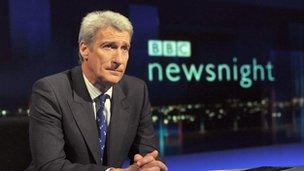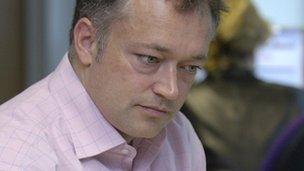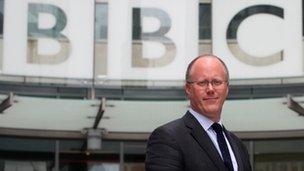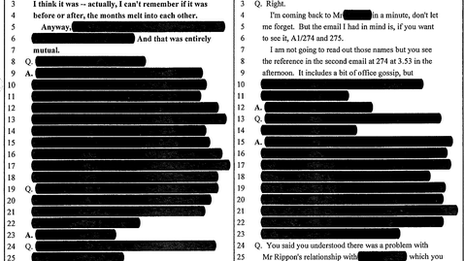BBC Savile inquiry: Who said what
- Published
The BBC has published thousands of emails and interview transcripts gathered by former head of Sky News, Nick Pollard, in his review of why BBC Newsnight axed a report into abuse by Jimmy Savile.
Here are some key quotes:
Jeremy Paxman, Newsnight presenter
On why he believed the decision not to run the Savile investigation was wrong: "These people [paedophiles] prey upon children in vulnerable situations and when the children complain they are not believed. I thought that we [BBC Newsnight] had behaved just like many other authorities and I didn't like it."

Newsnight host Jeremy Paxman said the programme's resources had become stretched
On Savile, he said: "It was, I would say, common gossip that Jimmy Savile liked, you know, young - it was always assumed to be girls. I don't know whether it was girls or boys. I have no evidence of it, and I never saw anything that made me take it more seriously than it being common gossip."
On why the BBC had not dealt with the Savile story sooner: "We wouldn't even tackle a bloody story that was about our own programme. This is pathetic."
In an email to Peter Rippon, he said he believed the decision not to run the investigation had been wrong, but added: "… just for the record, I think it is very unfair (and sadly not at all untypical) that the BBC has dumped all this on one individual. It will pass. But I think the BBC's behaviour now is almost as contemptible as it was then."
In another part of his correspondence with Peter Rippon, he said: "It's disgusting the way the BBC is hanging you out. It must have a corporate decision, whatever your blog says."
On Peter Rippon's response when he asked the editor about his decision to drop the Savile investigation: "What struck me about it was his reply when I mentioned the reasons. He said, 'I am sorry, I just can't do this'. And I thought that was a very, very unusual word to use, 'can't' …and I didn't say, 'what do you mean can't? Someone has told you that you can't, or you physically can't face it?' Now I think - my suspicion is that there may well have been an element of both."
When asked if the Savile report was a typical Newsnight story, he said: "...I think it would have been not a Newsnight story in some respects. I mean, I don't find it surprising that some people said: 'Look, this isn't really for us.' It is not our normal sort of territory."
On the working environment at Newsnight: "...the resources are extremely stretched and that doesn't make it a satisfactory environment in which people are making difficult editorial judgements about the longer term."
Speaking about the top positions in BBC News, Mr Paxman said: "So it is, you know, led by Helen Boaden, a radio person. Her second-in-command is Steve Mitchell, a radio person. Peter Rippon was a radio person. These people belong to a different kind of culture."
On the BBC's promotion of Jimmy Savile: "The really important question here is: what was the BBC doing? ...what was the BBC doing promoting this absurd figure, this absurd and malign figure? And I think that this is to do with the fact of the BBC having been aloof from popular culture for so long. Suddenly pirate radio comes along and all these people in metaphorical cardigans suddenly have to deal with an influx… of people from a very, very different culture, and they never got control of them and I am not sure even now they have.
"That is the reason there are ongoing legacy issues here too. But they... have never felt comfortable with popular culture, and they have therefore given those who claim to perpetrate it too much licence…"
Lord Patten, chairman of the BBC Trust
On why it took so long to correct the Newsnight editor's blog: "We were very angry... I am pretty convinced that people knew the blog was incorrect. It does seem to me that there are reasonable grounds for assuming that people knew the blog was dodgy a lot earlier and that we were left defending something which wasn't true."
Lord Patten said he went "on the old-fashioned assumption that I am able to trust what I am told... Is a lesson I should take from this that I can't believe it when I'm told things by the next director general, that I have to query everything he says or the director of news says to me or whatever?
"With the next director general - or his senior colleagues - I won't begin every conversation on the assumption that they or she may not be telling me the whole truth, but I will want to be more convinced that there is a structure in place which ensures that the truth is being told."
On senior BBC management: "It wasn't just a joke when I went to speak to the senior leader's group in the BBC and said they had more senior leaders than China. The management team, the senior management team, that the previous director general [Mark Thompson] had was 27 - 25 or 27. They never met."
Peter Rippon, Newsnight editor

Peter Rippon: "...these stories... can be very difficult to pull off"
On Helen Boaden saying that the evidence threshold for the Newsnight report needed to be as high as if Jimmy Savile were alive: "I'm confident that if she had said that, I would have remembered it, because I wouldn't have thought… I wouldn't have agreed with it. So I'm confident she didn't say that."
On his doubts about the Savile report: "I think, when we got the final CPS confirmation emphatically denying some of the things the woman had been telling us, that was - that was the point at which I made a final judgement about what I felt about the strength of the testimony we gathered.
"So the way I do investigations - and I have been given awards for doing them - is that I do give the reporter and producer - Liz [MacKean] and Meirion [Jones] in this case - quite a lot of free rein, particular in the initial stages of these investigations to pursue things as they see fit. As I say, I'm doing an awful lot of other things at the same time."
When Newsnight journalist Meirion Jones first proposed doing a story on Savile, Mr Rippon said: "I felt that you need to be careful in the climate immediately after somebody's death about doing these kinds of stories... there are often difficulties with the strength of testimony… So they are not easy to land and Newsnight is not a programme that has a massive amount of resources, so if you are going to jump into something you need to be - to think carefully about what kind of outcome you are likely to get."
Asked why he felt "lukewarm" about the Savile report, Mr Rippon said: "...it was a combination of a feeling in my stomach that these stories... can be very difficult to pull off... and doing it so soon after his death was going to compound that."
Responding to the suggestion by Liz MacKean in an email to a friend that he had said 'the girls were teenagers, not too young, they weren't the worst kind of sexual offences', he said: [The suggestion is]"outrageous" and [I] "can't recall this conversation".
Peter Rippon in an email dated 29 August 2012 to Helen Boaden, Stephen Mitchell and Helen Deller regarding Newsnight dropping its Savile investigation: "It is outrageous to suggest some conspiracy. I dropped it because we were unable to establish any institutional failings by any party so we were left with very old allegations that were more sexual harassment than assault, made by woman who's [sic] evidence would have been undermined in a court because of their known character.
"The danger for ITN here is that what this really shows is that the rigour and standards of proof we apply to our journalism is much higher than their own. Someone needs to make that clear to them."
George Entwistle, BBC director general (Sept - Nov 2012)
When asked if he had reflected on Newsnight's Savile report and the BBC's managed risk programme list, Mr Entwistle said: "I must admit I don't remember reflecting on the Jimmy Savile piece and the managed risk programme list."
Asked if he had any other conversation with Helen Boaden about the Savile report, he said: "Not that I can remember, no."
He adds: "I don't remember anybody from News coming to say: 'It's over, we're not going ahead with it.'"
On influence from BBC News when he was director of BBC Vision: "No, I can't recall anybody from news coming to me with an editorial anxiety of any sort... I would expect it to go up through their own management."
On Peter Rippon's blog, explaining the decision making on Newsnight's report on Jimmy Savile: "…was it not expecting too much of Peter Rippon to be able to write an accurate blog about what had happened… it just doesn't seem to me to be an unreasonable thing to expect your editor of a programme and especially not the executive producer of the film, to be able to do…."

George Entwistle, former director general
More comments on Mr Rippon's blog post: "…I couldn't necessarily rely on Peter Rippon's account of what happened. That obviously takes you to the blog but in actual fact it took me philosophically to a different place first, which was this was a very unusual state of affairs. Could it be that this editor was in charge of an investigation he didn't understand?
"…it started to be apparent to me that the relationships had broken down on the programme and what I wondered was Rippon could be right that these two people could be making a tremendous amount of trouble for him. So I still wanted to keep alive in my mind that possibility that Peter Rippon might be telling the truth about what the investigation was, or they might be telling the truth, or none of them might be telling the truth, or they all might all be different bits of the truth."
On Helen Boaden, the director of news: "I don't remember Helen saying: ' I offer you my resignation,' and me having to talk Helen out of it."
Mr Entwistle said he had not known until "recently" that the BBC had put up an online notice board in tribute to Savile, and that some readers' comments about molestation and paedophilia regarding the late DJ had not been published.
He adds: "...and there was a particular set of, I think, instructions given to the moderator to avoid certain contributions about a certain named individual who was a woman who, I think, who was a hoax victim. Apparently they had been hoaxed at some point in the past, the BBC website, to do with Savile..."
George Entwistle on legal issues surrounding the Newsnight investigation into Savile: "The legal department became very actively engaged in understanding what had happened on Newsnight at the point where I panicked about whether the team on Newsnight knew they had given anything to the police or not - everything to the police or not.
"So the initial point of engagement between BBC Legal and Newsnight was me saying to them: 'I need better assurance than I'm getting about whether everything that should have gone to the police has gone to the police.' And a lot of information started to come in at that point which then proved useful in the business of trying to work out exactly [what] had happened editorially."
Entwistle on the culture of entertainment in 1960s and 1970s: "But obviously since this has all happened I've been involved with conversations with people, for example [redacted] who have said - and I have never thought anything of it, particularly, but it was always said, for example, that if you were [redacted] back in the 60s or 70s, there was an awful lot of sex going on, you know, a lot of [redacted] marriages got broken up because they were getting involved in extra-marital sex [redacted] and this kind of thing."
He added that the extra-martial sex was "not necessarily" between adults but "possibly adult with quite young women, was my sense".
Peter Horrocks, global news director
On the way Savile probe was carried out: "Some of the Newsnight team had started to… question the way that Meirion Jones and Liz Mackean had done some of those things [in the investigation].
"I have my own questions about whether they at all times did the right thing. I am not coming in here and saying one group of people did it right and one group of people did it wrong, there is [sic] issues and questions for everyone."
On relations between different teams at the BBC: "There was an atmosphere between different teams that was complicating the ability to get to the bottom of things."
"I had direct knowledge of Newsnight for the best part of 30 years and I would say it is a more divided team than most."
Describing his open-plan working environment: "It is like an episode of The Thick of It where I work and Helen Boaden works and outside is the Director General work [sic]. There are a small number of meeting rooms, we are going in and out, playing different roles, Chinese walls where there are no walls."
Nick Vaughan-Barratt, head of events
Mr Vaughan-Barratt told George Entwistle he "felt uncomfortable about preparing a BBC obituary" about Savile due to the "complex nature of the man".
He said: "So I think the common currency was he was weird, he was creepy, he was odd.
"You know, he kept his mother's clothes 40 years after she died and had them dry cleaned every year. He travelled round the country in a camper van and he's very strange.
"I genuinely don't think the common currency was this man was a sexual predator of underage girls… or an accusation of rape or whatever else. I don't think that was the common currency - well, it wasn't the common currency that I heard."
Kirsty Wark, Newsnight journalist
On Peter Rippon: "I mean he let his editors edit on a daily basis. In that way he was neither overbearing nor too reticent.
"But sometimes I suppose what I would say about that was he - and on a personal level he was a very, very nice person… And I think that at times he found the job very onerous."
She said the problem with the Savile investigation "was definitely a communications problem between Meirion [Jones], Liz [MacKean] and Peter [Rippon]".
On Peter Rippon's blog: "…actually for something like this I'm not sure the blog was the right vehicle, because clearly we were dealing with something incredibly difficult and serious and it wasn't just a kind of weekly chat."
Mark Thompson, BBC director general (2004 - 2012)
"The unfinished investigation into Jimmy Savile by Newsnight was not referred to me… I do not know with certainty what journalistic material the team had amassed and on the basis of what evidence and advice the decision was taken not to proceed with the investigation. I therefore do not know whether… the decision was a reasonable or unreasonable one.
"Investigative journalism has been very strong at the BBC in recent years and it is a great pity… for the victims and their families that… we were unable to bring their stories to the public.
"Like many other people who have devoted their lives to this institution, I feel both sad and angry that such terrible crimes and suffering occurred within the BBC."
Helen Boaden, director of news
Asked about the relationship between Newsnight editor Peter Rippon and his staff, she said: "Peter had a very difficult time with two people [redacted]. One of them is [redacted] and the other is [redacted]."
On the team: "...I'm saying I was aware of two problems within the team. I was not at all aware that there were issues with [Newsnight journalists] Meirion [Jones] and Liz [MacKean]. I think from the vitriol that emerged once the ITV programme went out and the issues around the blog... it is perfectly obvious that there were significant problems."
On one redacted BBC staff member's view of Newsnight editor Peter Rippon: "His view was that Peter was a very decent man who did news analysis well, but he, in his view, lacked the leadership qualities that [redacted] thought were necessary in an editor of Newsnight."
On problems within Newsnight and Peter Rippon's efforts to fix them: "I think Newsnight has been a troubled programme for some time. Steve and I put Peter in there to try and address some of these problems. You can decide whether you think he was the right person or not. He has real strengths, particularly around news analysis.
"He's joined Newsnight to the news family, which is important, because Newsnight is a bit like an old colonial power with a lot of old colonial power attitudes, refusing to accept a more modern world with less resource, a digital challenge and at times, with a sort of almost contemptuous or sneery attitude to the work of the rest of the news group. Peter is collaborative and he has tried to address some of those things.
"…if you talk to former Newsnight editors and former heads of news they would say Newsnight always rush their investigations. You know, it is a daily programme dealing with weekly events… but the other thing is I think the BBC - and, you know, I'm on the executive board so this is partly my responsibility - has increasingly asked editors to be managers.
"You know, we have cut back on the back office staff. We have them doing, you know, responsibilities for the editorial, responsibilities for the people. More and more of that has shrunk the amount of time you can spend on the editorial. It is still the core of what they do but I wonder if we need to rethink that."
When asked about the strength of the Savile report, she said: "I took the strong impression from my conversation with Steve [Mitchell, head of programmes] that actually this was smoke without fire largely. And I think I was affected in this by the assumption that stuff like this comes out when celebrities die, which may be wrong on my part, but I think that had to some extent conditioned the way I saw it."
On telling then head of BBC Vision - overseeing TV programming - George Entwistle about the Savile report at an awards dinner, she said: "George was not well - had an extremely bad cold, and I got him to one side when there was, as it were, nobody around... I think he said: 'Thank you, keep me posted.'"
On whether there was any indication Mr Entwistle knew of Savile's predilections: "Absolutely not. He didn't - he didn't. No he didn't. He just said: 'Thank you, keep me posted.' I mean he was quite poker faced, really."

Heavily redacted passages in Ms Boaden's transcript for the Nick Pollard review
On the absence of the Jimmy Savile story from the BBC's managed risk list, she said: "No, I didn't notice the absence of Jimmy Savile. I didn't - I just simply didn't register it. I was looking at what's on the list, not what was not on the list. My memory is that it was Steve who told me we needed to alert George to the Savile investigation."
Asked if Ms Boaden ever met Jimmy Savile, she said: "Yes, that was the Radio Academy lunch where Jimmy Savile was inaugurated into their hall of fame. I was chairman of the Radio Academy and was asked to host a table and sit next door to him.
"And he came to the lunch, he kissed my hand at the beginning, he kissed my hand at the end. He said not a word to me between those events and at the very end he went round and had his picture taken with a great many people.
"To be brutally honest, in that role I had to sit next door to quite a lot of people I didn't find very easy to sit next to, because they are just a slightly unknowable lot, old radio presenters. I just got on with it. They asked me to do it, it was my job."
Asked if she had heard any dark rumours about Savile, she said: "No, I had never heard any dark rumours about Jimmy Savile."
Referring to her conversation with Newsnight editor Peter Rippon on the Jimmy Savile investigation, she said: "When I asked him what that was he said: 'Jimmy Savile and teenage girls'. And since this, I think, was about three weeks after Jimmy Savile had died I thought it was one of those slightly tabloid-esque stories involving groupies. I said: 'That doesn't sound like core Newsnight territory', but Peter went on to suggest that it was a very different story from that. It was about sexual abuse, it was about sexual abuse of teenage girls.
"The thing that was always critical for me in this very short conversation was that because Jimmy Savile was dead was not a reason for lowering what I regard as BBC editorial standards."
In an email to Steve Mitchell, referring to Meirion Jones and Peter Rippon's disagreements, she said: "It seems to me this basically comes down to two boys fighting for control of a complex and complicated story which should have involved sensitivity, as well as rigour, proper evidence, proper interviews, and failing to manage the most basic elements, what was the story about? Their lack of precision on almost every front terrifies me."
On BBC management's handling of the Savile scandal: "I think the problem was none of us were focusing on the allegations. We were focusing on the allegation of a cover up."
The job titles used on this page relate to each person's position at the time the statement was given to the Pollard Inquiry.
- Published22 February 2013
- Published22 February 2013
- Published23 October 2012